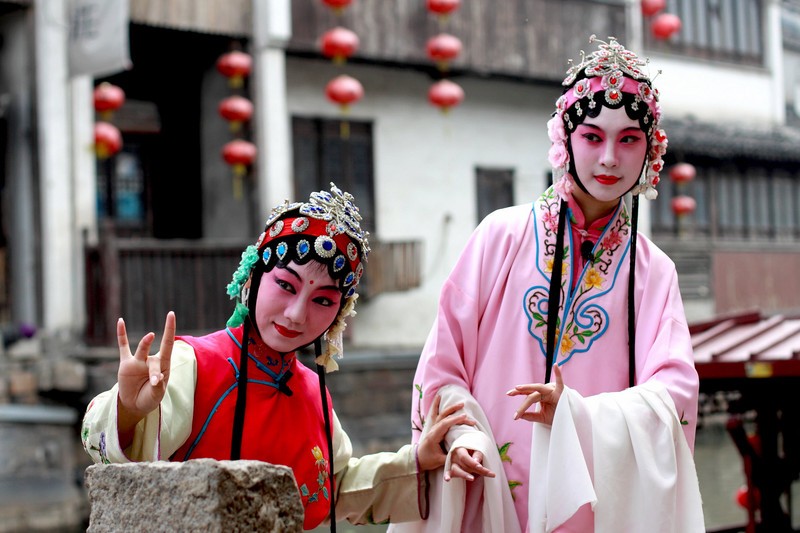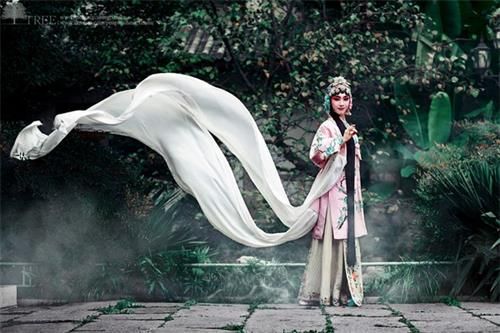24 Hours Hotline: +86 137-3541-1378
Email:[email protected]
24 Hours Hotline: +86 137-3541-1378
Email:[email protected]

AN Australian working for a Chinese media group was curious about Chinese opera and decided to see a performance of “The Peony Pavilion.” Her workmates were only glad to arrange a ticket, but when it came to volunteers to accompany her, no hands went up. Her young Chinese colleagues scoffed at the idea of traditional opera.
Traditional opera in the age of heavy metal, hip-hop, punk rock, Cantopop and other contemporary music can take some getting used to.
Carol Wang, an administrative worker in her 20s, says she always thought of traditional operas as boring and overly stylized, with plots disengaged from modern life.
However, she changed her mind after watching a performance of the Kunqu Opera “The Chairs,” an avant-garde interpretation of the farce by French playwright Eugene Ionesco, at the recent Shanghai Traditional Opera Festival.
“It was beautiful,” Wang recalls. “The play combined a sentimental story about love and life with the aesthetics of traditional Chinese opera. The stage setting was simple, just one table and two chairs. But so many different emotions were expressed.”
The performance, according to critics, successfully combined elements of the “theater of the absurd” with the time-honored traditions of Kunqu. The show is expected to tour international theater festivals this year.
The recent Shanghai festival staged nine innovative performances spanning the genres of Peking, Kunqu, Huaiju, Yueju and Yuju operas. Some were first-time adaptations of classic movies and Western novels.
Chinese opera still resonates with many older people, but the goal now is to try to attract younger generations, both as audiences and participants.
Officials at the Shanghai Center of Chinese Operas said the Shanghai festival offered a platform for young performers and original scripts.

While not abandoning the essence of traditional Chinese opera, troupes in Shanghai are keen to shed the stereotype of an old-fogey art form by staging shows with new performing styles, artistic stage designs and appealing stories.
One of the most prominent Chinese genres is Kunqu Opera, which dates back 600 years. It has been included in UNESCO’s list of cultural heritage.
Last year, the Shanghai Kunqu Opera Company was invited by the Greek government and the Stavros Niarchos Foundation Cultural Center to present the classic “Leifeng Pagoda” and excerpts of “The Peony Pavilion” and “Journey to the West.” The performances were a big hit with audiences in Athens.
The company’s 3D Kunqu Opera film “The Bell Tolls for a Dynasty” won the Best Opera Film award at the Canada Golden Maple Film Festival.
The troupe has also mounted a new original opera focused on Xue Baochai, a main character in the Chinese literary classic “A Dream of Red Mansions.” The company’s fantasy romance “Chang’an Snow” was also lauded for its sensitive probing of human personality.
According to troupe officials, a new production of the Kunqu Opera classic “The Palace of Eternal Youth” will be staged at the Chinese Opera Festival in Hong Kong this summer. It will present a more detailed interpretation of the tragic love story of Tang Dynasty (AD 618-907) Emperor Li Longji and his concubine Yang Yuhuan.
According to Wu Peng, deputy director of the company, two types of performances tend to grip overseas audiences — those based on classic Chinese plays and those that experiment with more modern-day plots.
“Preservation of the ages-old art form is still the basic task for us,” Wu says. “We are very careful in selecting the most appropriate Western plots to perform.”
This year will conclude a three-year course offered by the troupe to cultivate young talent. The students are receiving lessons from celebrated artists like Cai Zhengren and Yue Meidi in the performance of six operas and 100 opera excerpts. The lessons have been videotaped for digital preservation.
Peking Opera is considered a national treasure. The performances extend beyond its namesake.
The Shanghai Peking Opera Company is actively trying to cultivate a younger generation of aficionados by incorporating some modern perspectives into ancient works.
Last year, a series of performances of “Crown the Clown” drew interest from young people. Yan Qinggu, a third-generation student of the Zheng School of Peking Opera, is both a performer and producer of the show.
The performances highlighted the art of chou, a form of comedic role used to represent characters who are either buffoons or villains in Peking Opera. Young audiences particularly seemed to like elements of martial arts and witty cross talk among characters.
According to Yan, each performance of “Crown the Clown” had a box office of about 100,000 yuan (US$15,000), with 90 percent of theater seats filled. Many in the audience were young people who had never sat through an opera before.
“It was our first-ever attempt to combine Peking Opera with pop cultural elements,” says Yan. “Many college students told us that the talk-show format focusing on life and love brought traditional theater closer to their lives. We are thinking of doing a second season of the ‘Crown the Clown’ this year.”
One of the highlights of 2018 will be the troupe’s performance of “The Revenge of the Prince,” an adaptation of Shakespeare’s “Hamlet.” The Peking Opera version of the classic play has been performed in more than 10 cities offshore. It will be staged in Denmark this August to open the Hamlet International Art Festival.
Peking Opera performer Fu Xiru plays the role of the Chinese Hamlet, who seeks revenge when he learns that his uncle has murdered his father.
The main thread of the original tragedy has been preserved, but the setting has been switched to a royal court of ancient China. Chinese martial arts and acrobatics feature in action scenes.
The company’s second season of “Youth Runway,” a five-year talent training project, also continues.
Pingtan — storytelling set to musical lyrics in the Suzhou dialect — dates back about 400 years. To modernize the genre, artists from the Shanghai Pingtan Troupe are experimenting with performance and stage innovations.
The troupe’s original production of “Lin Huiyin,” a tale based on the life of the famous poet and first female architect in modern China, was widely applauded by students when it was staged at Fudan University last year. A nationwide tour was equally successful.
This year, the troupe will revise the script for “Lin Huiyin” by adding more content related to her efforts to protect ancient Chinese architecture.
Gao Bowen, deputy director of the troupe, added diverse musical elements such as jazz and rock to the classic Pingtan tunes in a performance at the Shanghai Concert Hall.
Young Pingtan performer Lu Jinhua created the script and vocals for the show “Jack and Rose,” based on the storyline of the Oscar-winning movie “Titanic.”
Last year on Qixi, also known as Chinese Valentine’s Day, Lu presented a special Pingtan performance themed on romantic stories related to legendary Chinese woman warrior Hua Mulan and 20th century Chinese poet Xu Zhimo.
Shanghai Museum also collaborated with the troupe on a crossover show. The museum mounted an exhibition of the manuscripts and letters of ancient Chinese artists, including Tang Yin, Wang Chong and Wen Zhengming. The stories in the manuscripts were adapted into Pingtan performances.
Old classics such as “Romance of the Three Kingdoms,” “White Snake” and “A Dream of Red Mansions” have been adapted. And for the first time, Wu Xin, a performer from the troupe, combined Pingtan with the elements of Chinese folk music in the show “War Horse: Chitu.” It’s a new interpretation of the “Three Kingdoms” stories.
The troupe regularly holds open days aimed at appealing to younger people through informative talks and interactive events.
A new show entitled “The Love of Earth” will be presented, based on the essays of President Xi Jinping.
The troupe’s acclaimed play “Four Beauties of Ancient China” is also expected to be performed in Japan, Europe and North America.
Wechat: Chinaprivatetour
24 Hours Hotline:
+86 137-3541-1378
* Authentic Experiences: Genuine local experiences that immerse you in the true essence of Suzhou and beyond.
* Safety First: Highest safety standards with secure activities and reliable transportation.
* Customizable Tours: Flexible itineraries tailored to your interests and needs.
* Local Expertise: In-depth knowledge of Suzhou and China, offering exclusive insights.
* Professional Guides: Licensed bilingual guides with over 5 years of experience.
* Comfortable Travel: Experienced drivers and well-maintained vehicles for a smooth journey.
* Sustainable Tourism:Commitment to responsible tourism and supporting local communities.
* Customer-Focused: Personalized service and continuous improvement based on your feedback.
* Free Cancellation: Cancel up to 24 hours before travel for flexibility and peace of mind.
* 24/7 Support: Round-the-clock assistance for any questions or help needed.
1 to 1 tailor-made service from our professional travel advisors for the most sophisticated
Constantly excellent reviews for attraction, hotel and service Competitive price
Local experts provide quality tours Best selected knowledgeable local guides Authentic local restaurants
7*24 hours available to create you a worry-free tour. No Hidden Fees and absolutely no pressure to buy. Secured









Copyright © 2017 Suzhouprivatetour.com All rights reserved. 浙ICP备18056007号-4